69% of road users say the state of Britain’s roads is not good enough
- 80% are very concerned about potholes
- 79% think traffic is getting worse on all roads and action needs to be taken
- 67% are very concerned about pollution from traffic
- Road users are open to new forms of funding
A new poll commissioned by the 2017 Wolfson Economics Prize has revealed widespread dissatisfaction with the state of Britain’s road network. The poll of over 2,000 adults has been released as five finalists compete for the £250,000 2017 Wolfson Economics Prize which will be awarded this week for the best idea for paying for better roads.
This year’s prize question asks ‘How can we pay for better, safer, more reliable roads in a way that is fair to road users and good for the economy and the environment?’
The winner will be announced at an event in central London at 7pm on Thursday 13th July.
The prize finalists – chosen by a leading panel of judges including the former Chancellor Alistair Darling – in April – have competed head to head in the second round for the prestigious prize and their final entries are being published today.
Leading motorist groups the AA and RAC Foundation are among those contributing to them.
The poll, undertaken by ComRes, shows that drivers are very concerned about fixing potholes, pollution from traffic and traffic more generally, and only 50% think the current system of road funding is fair. A majority of road users say that the argument that pay-per-use will be fairer – as those that use the roads more should pay more – is persuasive.
The poll also shows:
- 80% say they are very concerned about fixing potholes, and 79% say traffic is getting worse on local and national roads and that action needs to be taken, while 67% are concerned by pollution from traffic.
- Only 26% say the current state of roads is good enough.
- 30% think current road taxes should be increased to pay for improvements and 30% support a new pay per use system.
- 39% of people travel by car every day and 94% travel by car at some point. By contrast only 3% use trains every day and 5% buses.
The 2017 Wolfson Economics Prize – the third to be run – attracted worldwide interest with over 120 entries from 7 countries.
The founder of the Prize, Lord (Simon) Wolfson of Aspley Guise, said:
“Congestion, pollution and potholes are a source of daily misery for millions of people: undermining our economy, environment and quality of life.
“But as our polling reveals, the Government has the backing of drivers to overcome the problems facing Britain’s road network and create a sustainable model of funding for the future.
“Our five finalists have come up with an array of innovative ideas. If they are open to new thinking, policymakers can learn much when our panel of judges – with significant experience across Government, transport, infrastructure and the media – choose a winner this Thursday.”
Finalists
Full details on all the finalists can be found below (click + to expand details):
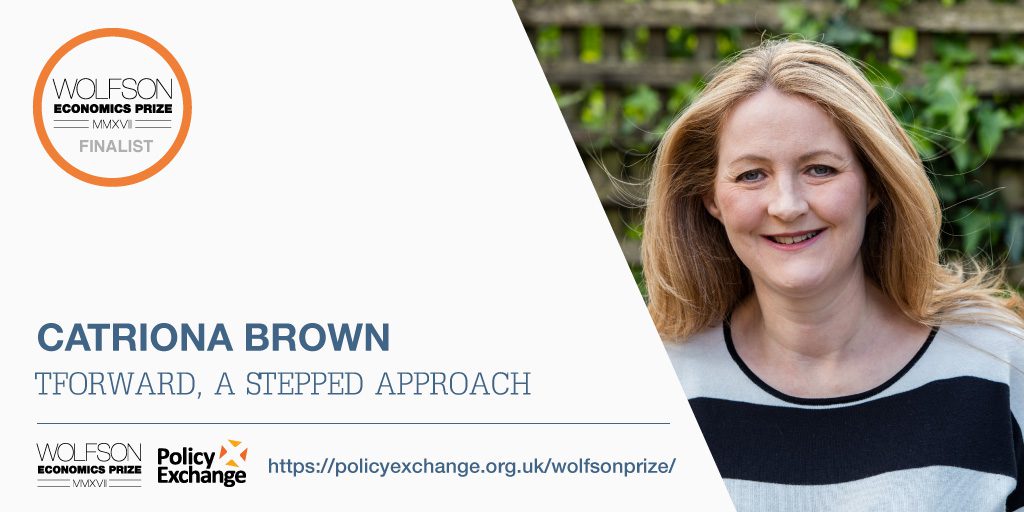
Download Full Submission
Catriona’s entry argues that a rapid shift to a single national plan for road pricing would fail in the face of political and technical objections. Instead she backs greater investment in roads through gradual steps, starting with building a technology platform which she calls “TForward”. This creates economies of scale, and enables the intelligent integration and upgrading of existing charging systems such as the London Congestion Charge and HGV levy. The platform could then fund much needed new roads, alongside improvements to existing roads such as fixing potholes. Local authorities would be encouraged to take part, addressing congestion and pollution in their area. Electric and autonomous vehicles would be included and their spread would support a bigger shift. Integrating public transport would make it easy for people to combine alternative modes of travel. The platform could be “exported” to other countries facing similar challenges, creating an international solution and a new transportation industry with many skilled jobs.
Her big idea
Solve road congestion and pollution by harnessing technology to drive investment and cut costs.
Biography
Catriona is a busy mother with two young children, and expecting her third child next week. Catriona does not have a professional background in transport, but her everyday frustrations with road congestion have motivated her to draw on her background as a lawyer to find solutions.
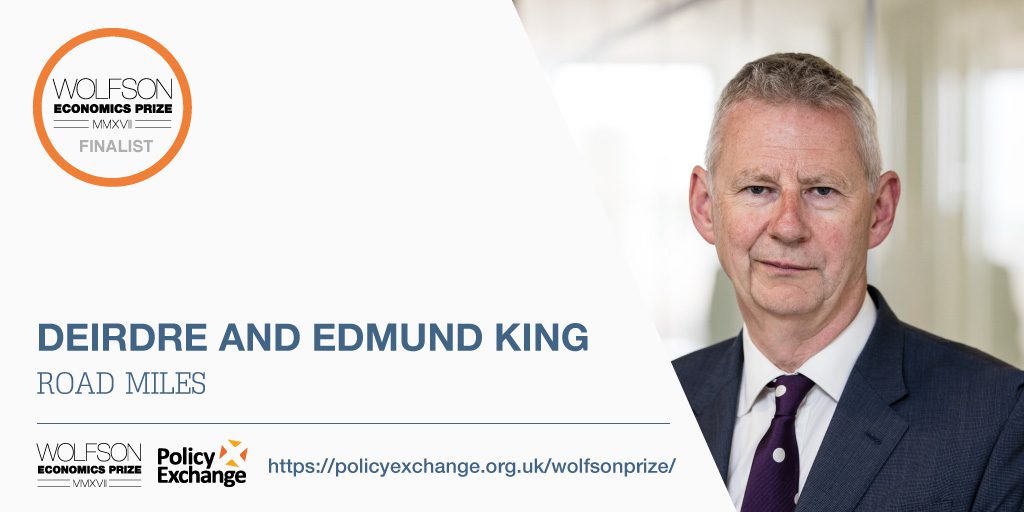
Download Full SubmissionDeirdre and Edmund King’s entry promotes Road Miles –a new and popular way of paying for roads, which helps the transition to electric and autonomous vehicles and their future infrastructure needs. Drivers pay less. More is spent on roads, tunnels, cycling, buses and Government gets £2bn extra per year.
They argue road users get a raw deal: paying the highest taxes in Europe alongside a congested and deteriorating road network. Under their proposal, drivers benefit from at least 3,000 free Road Miles each year and a telematics dongle which charges a small amount after the free miles and fuel duty discounts are deducted. Rural drivers get 1,000 extra Road Miles. Elderly, disabled, unemployed and young drivers save 15% costs. Fuel duty drops 20% within five years to 47p/litre. Drivers are compensated for excessive roadwork delays and closures.
Their Road Miles Innovation Fund will stimulate faster uptake of cleaner vehicles, reduce congestion and strive for a Vision Zero Road System with no fatalities.
Commercial income comes from a national lottery, Adopt-a-Highway naming rights (e.g. Apple A1), and from an auction where manufacturers and retailers could bundle free Road Miles with purchases.
Their big idea
Road miles become a new currency.
Biographies
Deirdre King serves as a director of Blueprint Consultants, and formerly worked as an economic business analyst for BSkyB and BBC Worldwide. She has also served as an economist at the British Road Federation. She holds an MSc in Economics from LSE and a BSc in Economics from UCL.
Edmund King has 25 years’ experience as a transport and motoring campaigner. He has worked for the British Road Federation and various motoring organisations and think tanks. He is Visiting Professor of Transport at Newcastle University and the AA president. Last year he received an OBE for services to road safety.
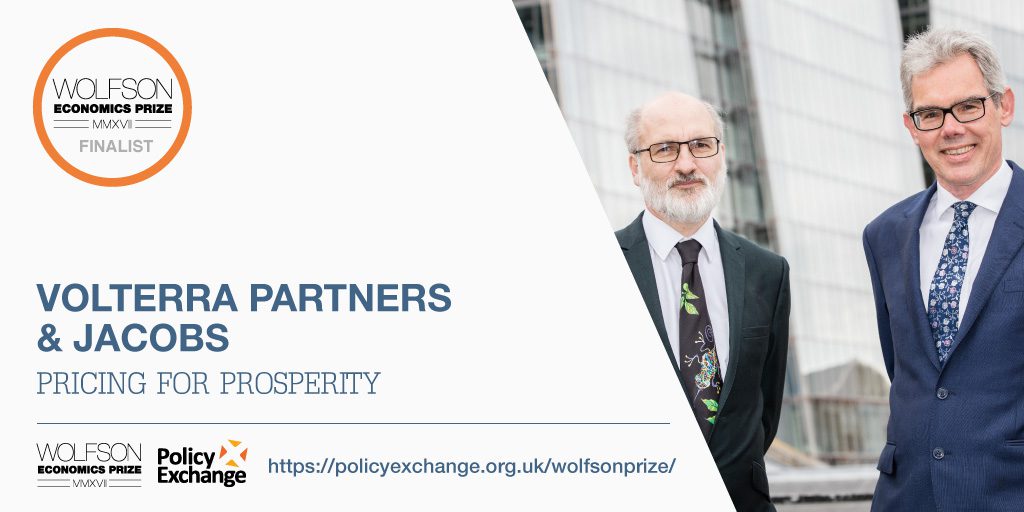
Download Full Submission
Our roads are congested, unreliable and poorly maintained. P4P sets out a new approach to deliver fast, reliable roads for everyone. It does this by eliminating fuel tax and VED and replacing them with variable charges for each journey helping drivers make better decisions on how, when and where to travel. Technology enables this, providing drivers with multiple options, in real time, for mode, routes, timing and cost, letting them pick which option suits them best. It will fundamentally change the relationship between road user and highway authority. If the authority fails to deliver the agreed journey time, drivers will be compensated.
The charges cover three elements:
- Congestion – applies at times/locations when journeys are slow and unreliable; no charge for 90% of vehicle kilometers. All revenues invested in improving the transport network;
- Environmental – charge for the adverse effects of road use (air pollution, noise) with revenues used to mitigate those impacts. Cleaner vehicles will pay nothing;
- Maintenance – vehicles pay according to the damage they cause. Revenues spent on highway maintenance to improve road quality.
Their big idea
A long-term, fair, efficient and flexible way to pay for better roads, while offering faster, more reliable and for the vast majority of car drivers, a cheaper solution.
Biography
Paul is an economist specialising in the transport sector. Paul has led many major project appraisals including Jubilee Line Extension and Crossrail. He has extensive overseas experience. Paul led the development of Wider Economics from Crossrail from 2002 to 2005, subsequently incorporated into DfT guidance. He is a partner at Volterra.
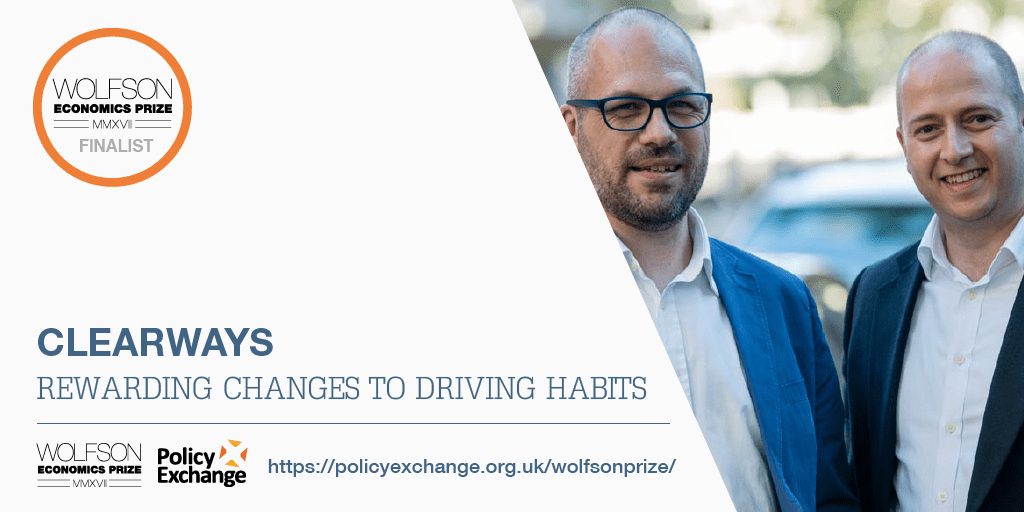
Download Full Submission
Download Executive Summary
Contributors: KPMG
Congestion is throttling the UK and is going to get worse if we do not use roads more efficiently. According to surveys, 20% of journeys in the morning peak, can be re-timed. Congestion can be greatly reduced by just a small percentage of people changing their driving habits. A reduction of 5% of peak journeys reduces travel times by almost 15%.
Clearways allows people to opt out of paying fuel excise (saving 57.95p per litre) and move onto a pricing plan which guarantees people will not pay more. Clearways encourages people to use the road more efficiently by rewarding them for changing their driving habits such as retiming outside of the peak or using public transport. Clearways has none of the disadvantages of approaches like road pricing. It is optional, it does not punish people for their existing driving habits and it does not rely on Government to implement the scheme.
Clearways improves quality of life, reduces costs of doing business, improves air quality and road safety, improves fairness and sets up the UK for transport services of the future such as autonomous vehicles. All this and it does not cost the taxpayer more or reduce Government revenues.
Their big idea
Clearways abolishes congestion by rewarding people for changing their driving habits.
Biographies
Jamye Harrison has over 20 years of experience in strategy, design and delivery spanning customer experience, technology and business architecture. He is a former Partner with Deloitte in Australia where he led the firm’s national Transport practice. As Co-Founder of Clearways, Jamye is passionate about addressing traffic congestion along with integrating our roads with broader transport networks – ultimately enabling people and goods to move easily through cities and regions. Jamye is an Adjunct Professor at the University of NSW in the Faculty of Engineering’s Research Centre for Integrated Transport Innovation and Chair of the Transport Taskforce at the Committee for Sydney – an independent policy think tank.
Russell King’s experience spans policy development, strategic planning and program delivery in transport, education and financial services. For more than 20 years Russell has pursued a passion for economic and social policy reform, most recently in Sydney as Policy Director for the NSW Minister for Transport & Infrastructure. As a Cabinet Member for Strategic Planning & Transport at Wandsworth Borough Council, he led significant policy innovation and service delivery reforms in inner London.

Download Full Submission
Contributors: Steve Gooding , Bhavin Makwana , Philip Gomm , Anneka Lawson and Matthew Derry For his final submission, Gergely has received input from the RAC foundation. Gergely argues that to restore trust between politicians and motorists, fuel duty and VED need to be replaced with a simple and fair distance-based charge that also captures road and environmental impacts.
The lighter and cleaner your vehicle is, the lower the per mile charge.
The total amount of tax collected from motorists will be the same as at present, with individuals paying in proportion to the distance they drive each year.
The charge will be collected by insurers who already manage all data necessary for calculating the charge. When a driver pays their insurance, they’ll also pay their ‘road bill’, thus avoiding issues of privacy and reducing administration costs.
The scheme won’t be vulnerable to political interference: the Office of Rail and Road will set the base charge, decide changes to it and ensures a fair proportion of the proceeds are ring-fenced for spending on both local and national highways.
The Treasury wins too. With both the number of vehicles on the road and total vehicle mileage projected to grow, government revenue will rise over time. This will stop and reverse the £2.3m, which the government is currently losing every day in decreasing fuel duty revenues.
His big idea
Miles Better: simple and fair charging
Biography
Gergely Raccuja was born in Budapest, Hungary. He read Politics, Urban Planning and Italian at UCL, graduating in 2015 with First Class Honours. In January 2016, he started as a Graduate Transport Planner at Amey Consulting in Birmingham. He has a keen interest in the role that technology will have in shaping the future of transport.
Lightbulb Awards
The judges also recognised two entries with “Lightbulb Awards” for originality. Full details on the two Lightbulb Award winners can be found below (click + to expand details):
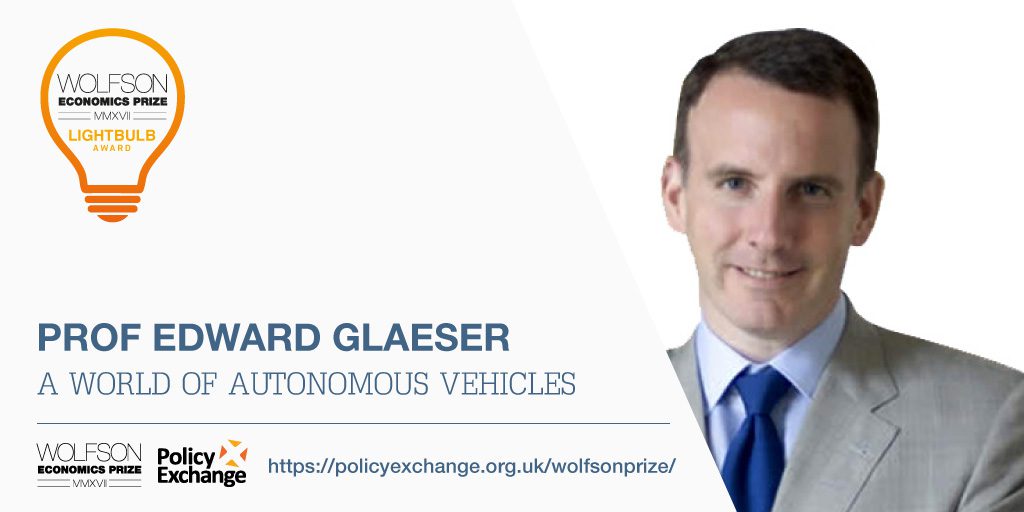
Professor Glaeser argues that autonomous vehicles are coming – and are part of the answer to a congested and underfunded road network. The transition will take time – and be done in different ways in different places – but as automation makes driving easier people will move from old forms of car ownership. This makes a new form of charging essential – to deal with more traffic – and it makes it practical too. There could be special lanes on main roads for autonomous vehicles and new ways of charging trucks.
His big idea
Let technological change solve the policy problem.
Biography
Edward Glaeser is the Fred and Eleanor Glimp Professor of Economics at Harvard where has taught since 1992. His research focuses on cities, including housing markets, transportation, urban growth and entrepreneurship. His is the author of “Triumph of the City: How Our Greater Invention Makes Us Richer, Smarter, Greener, Healthier and Happier,” and scores of academic papers.
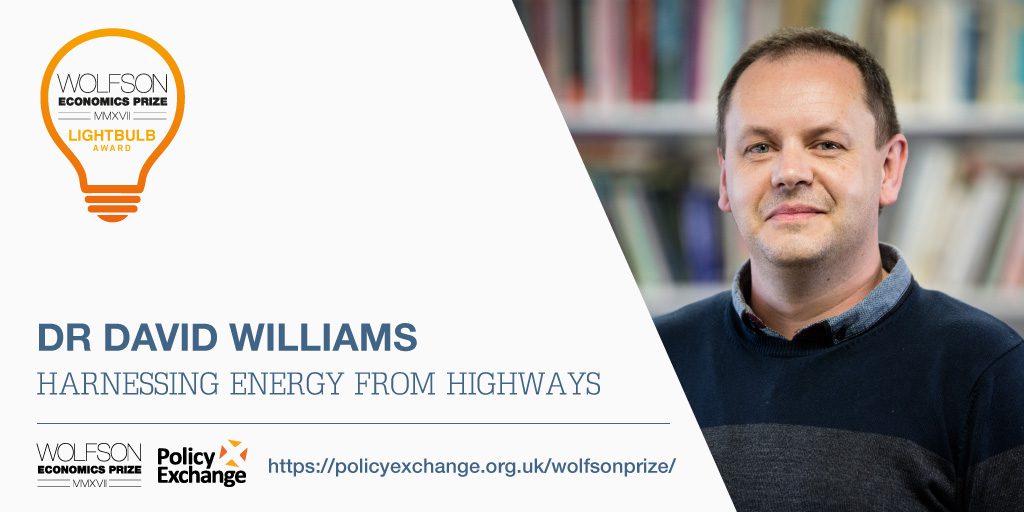
David Williams advocates that roads can do more than just provide a place to travel. If they could generate power, they could earn money to fund their repair and expansion. New technology means this isn’t fantasy: it’s practical and being tested already. Roads can be used to make solar electricity – they are warmed by the sun which is why tarmac can melt on hot days. A system of heat pumps could extract the energy to produce power (and be used in winter to melt ice). Systems making power from rain water and kinetic energy should be tried, too. Combining different sources of power could make this affordable and consistent. Little things will add up to a lot.
His big idea
Roads could keep the lights on and batteries charged up.
Biography
David works as a Research Associate in the Centre Sustainable Planning and Environment at UWE. He completed his PhD at UWE in 2015 and his research designed a sociological model to understand how the transport planning system locks us into unsustainable patterns of travel behaviour.

